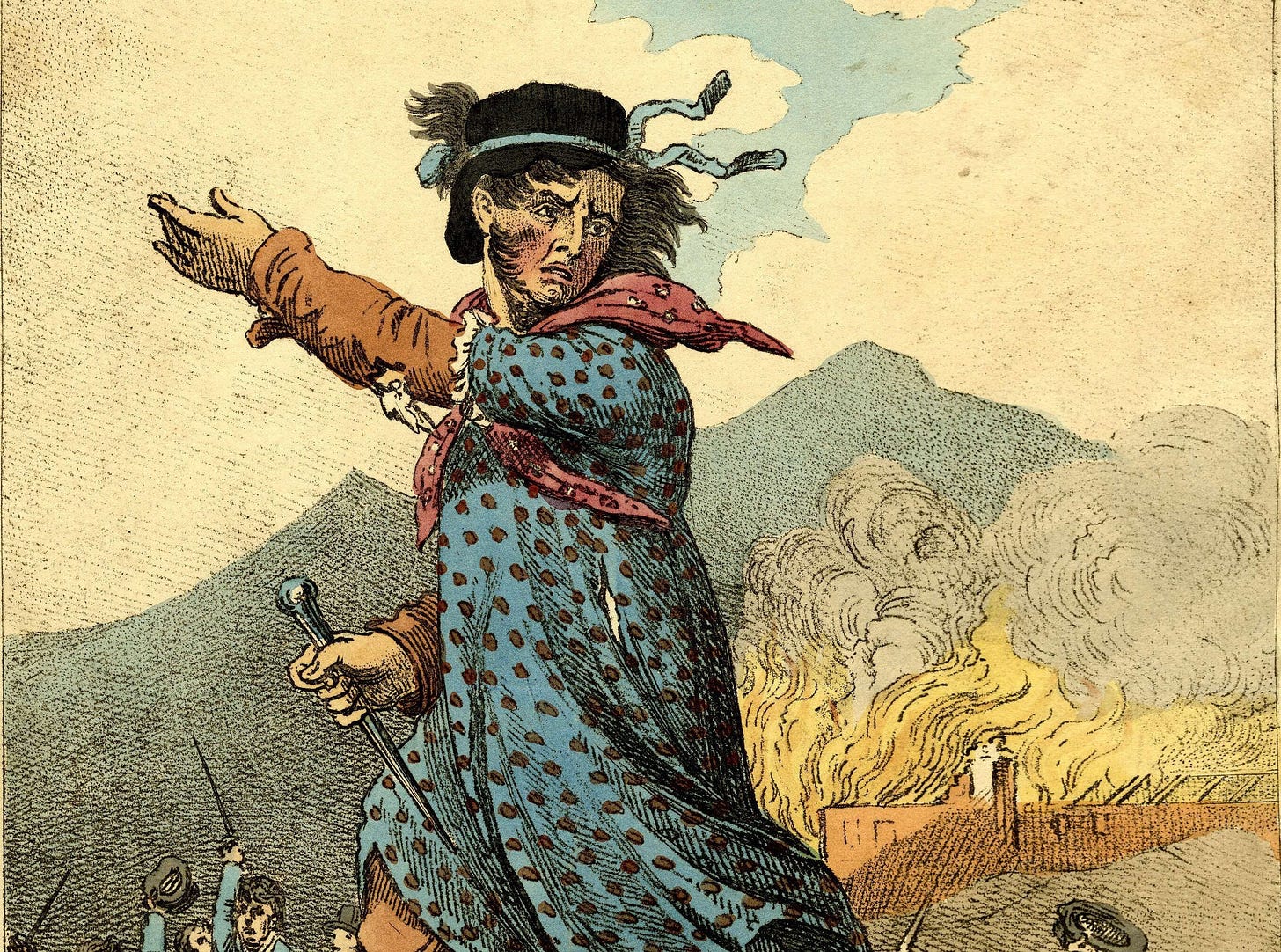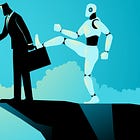History suggests the AI backlash will fail
From Venetian monks to 19th century textile workers, those opposing new technology have rarely come out on top

In the early 1470s Filippo de Strata, a monk and scribe based on the island of Murano in the Venetian lagoon wrote a public polemic, addressed to the Most Serene Republic’s Doge. His target was a still new technology which had recently arrived in Venice: the printing press.
As a monk, de Strata was outraged by the kind of works that printers were reproducing. “They basely flood the market,” he wrote, “with anything suggestive of sexuality, and they print the stuff at such a low price that anyone and everyone procures it for himself in abundance.” Even “young girls” were now, he warned, learning sinfulness from Ovid.
The Doge, as one might expect, ignored de Strata’s pleas. The printing press was not banned in Venice and young girls could still read Ovid.
But while de Strata’s preference for hand produced manuscripts might sound rather quaint to modern ears, his arguments that a new information technology would herald great social tumult — and indeed moral danger — are far from unique. They are echoed in the complaints of academics and teachers decrying the impact large language models are having on the ability of their students’ ability to think and learn, or fears that AI slop will rot the brains of today’s compulsive scrollers.
Every major breakthrough in communications technology has been accompanied by similar dire warnings. Plato famously argued that the writing was a poor form of teaching because readers were not truly thinking for themselves. Socrates feared that the written word would “create forgetfulness in the learners’ souls, because they will not use their memories.”
In the 18th century, the French statesman Malesherbes worried about the trend of people learning of current affairs from newspapers rather than hearing of them from the pulpit. In the 1930s it was feared that the radio would lead children astray from their studies and encourage them to stay indoors rather than playing outside. The result, according to many articles in the popular press, would be a generation of physically weak, socially and mentally undeveloped juveniles. A similar wave of alarm followed hot on the heels of television, the internet and smartphones.
Many of these complaints can broadly fit into the category of de Strata arguing as a monk; fears about the social and indeed moral impacts of a new technology, and especially of wider access to previously guardrailed and limited information and entertainment. All developments in mass media have provoked such sentiments and, so far at least, all such sentiments have mostly failed to prevent the technology spreading.
But as a scribe, de Strata also clearly worried about the future of his own livelihood. “The printers guzzle wine and, swamped in excess, bray and scoff. The Italian writer lives like a beast in a stall. The superior art of authors who have never known any other work than producing well-written books is banished.”
Here his concern was less to do with the potential moral catastrophe of young girls reading Ovid’s filth (which presumably was fine for morally pure monks to occasionally browse) and more to do with the direct economic impact on the Benedictine monastery on Murano, which like many other religious communities in late-medieval and early modern Europe, earned a great deal of income from producing hand written — and illustrated — manuscripts. The printing press was an obvious and direct threat to that income.
Other technologies throughout history have posed similarly significant challenges to the economic wellbeing of vast swathes of people, and in turn faced fierce opposition. Most notable of all was the industrial revolution.
The industrial revolution was the most important event in world history. It fundamentally changed the nature of human life, at first in Britain and then elsewhere around the globe. It transformed the world from a primarily agrarian society focused on agriculture and hand-crafted goods to one based on machine power and mass production.
Until the industrial revolution society had been subject to harsh constraints. In the language of the early economic thinker Malthus, human wants were infinite but human means were distinctly finite. After industrialisation, there were more people than ever before and people were richer than ever before. Such sweeping economic change reordered society and the country’s political structure. And given those ultimate results, it is not hard to see why the most famous opponents of the process of industrialisation, the Luddites, have tended to gather a bad reputation.
Nowadays Luddite is often used as a derogative term, a label for an unthinking, and incorrect, opponent of technological progress. Named for after the apocryphal apprentice Ned Ludd who, in legend at least, smashed two knitting frames that would have invalidated years of hard training in 1779, the Luddite movement peaked in the English midlands and north in the 1810s. The industrial revolution was in full swing and, in the textile industry in particular, new machines were being installed that could match the output of many previous workers. Operating mostly at night, bands of Luddites would attack factories and seek to destroy the new machinery.
As one poster, offering a £200 reward (more like £12,500 in modern money), from early 1812 explained:
WHEREAS, on Thursday Night last, about Ten o’ Clock, a great Number of Men, armed with Pistols, Hammers and Clubs, entered the Dwelling-house of George Ball, framework-knitter, of Lenton, near Nottingham, disguised with Masks and Handkerchiefs over their Faces, and in other ways, – and after striking and abusing the said George Ball, they wantonly and feloniously broke and destroyed five STOCKING FRAMES.
The government hit back hard, deploying around 12,000 soldiers to the Midlands and north and legislating to make machine breaking a capital offence.
In the long run, the industrial revolution was a major leap forward in human life spans and living standards. But in the short run, the Luddites had to live in the here and now. And the here and now of the early industrial revolution was not an especially pleasant one. The textbook “compensation effect” — labor-replacing technologies leading eventually to higher wages, standards of living and new jobs for those put out of work — was slow in coming, and the “displacement effect,” where workers found themselves cast aside after being replaced by machines, was especially severe. The three or so decades before the 1840s are still occasionally referred to by economic historians as part of Engels’ Pause — a time when productivity and profits were on the rise but wages and living standards were not, a trend first identified by the future Communist Manifesto author while he was living in Manchester. It should be no surprise, then, that the backlash was so visceral.
If anything, it is surprising how limited Luddism was, given how sweeping the changes ushered in by the industrial revolution were, and how miserable the experience of life in the new urban centres was for many. At a time when the country employed as many as 1m people in the textiles industry, the total number of active Luddites never rose above the low thousands. Most machine breaking bands seemed to have groups of under a dozen.
That offers clues as to why the Luddite backlash proved containable. Recent work by historians suggests that rather than being made up of the great mass of the downtrodden, the Luddites were primarily an elite group of relatively skilled workers; the kind of people whose occupations had previously enjoyed some form of legal protection and who, having served seven-year apprenticeships, believed they were owed a living.
As with the contemporary AI backlash, the noisiest complaints came not from the biggest losers but the ones with the loudest voice. For the skilled clothes-cutting croppers who led the Luddites in Yorkshire, technology being a direct threat to their livelihood was something new. For the great mass of unskilled workers, the grim reality of the 1810s was nothing special.
A similar divide can be seen in where many of the complaints about AI’s economic impact come from today. Many graduates in ‘skilled’ roles are increasingly vocal about the threat of AI, but barely cared about self-checkout machines in supermarkets, automated production lines in factories or even more recently the promise of self-driving cars.
For the Luddities, their loud voices were drowned out by the mass who benefited from the industrial revolution. The pool of potential winners was simply many times larger than the pool of potential losers. And crucially, the gains on offer to the winners were large enough that they were prepared to ignore the losers’ highly vocal shouts — and machine smashing.
That may be why those opposing the most fundamental change in economic relations so far received little public support outside of the communities directly affected.
Measures against their activity passed both houses of Parliament with overwhelming majorities. What little outside support they did garner came mostly from romantic poets. Lord Bryon’s maiden speech to the House of Lords, arguing that “nothing but absolute want could have driven a large, and once honest and industrious, body of the people, into the commission of excesses so hazardous to themselves, their families, and the community,” was one of the few against a harsher legal crack down. Bryon himself would later write a poem memorializing the Luddites.
The problem the Luddites faced was in many ways similar to that facing de Strata, as scribe rather than a monk, centuries earlier in Venice. The new technology in play — various types of textile machinery in 1810s England and printing presses in 1470s Venice — did put some jobs directly at risk. But most people were neither skilled textile workers nor scribes producing manuscripts. For most British people in the 1810s, the rapid advances in textiles manufacturing did not mean unemployment and old craft skills being invalidated, but instead offered the promise of cheaper and more widely available goods. For most literate Venetians in the 1470s, the printing press did not represent a fundamental threat to one’s financial security but rather the opportunity to access the written word on a scale previously almost unimaginable.
Will AI be different? What is new with AI is that the threat now is more to human brain power than human brawn. Artists, writers, lawyers, doctors, accountants and all sorts of other solidly middle to high earner professionals fear that AI will make their skills redundant, invalidate years of study and experience and leave them on history’s scrap heap. These groups make up a far larger section of the population today than they were at any point in history. Crucially, these groups also form the ruling class, exerting an outsized influence on politics and the media — an important difference from the industrial revolution, where the most affected groups had relatively poor democratic representation.
There is also every chance the disruption caused by AI could be even more extreme than that of the industrial revolution, and the gap between displacement and compensation longer, more severe and maybe unbridgeable. Today the dire warnings come not just from writers outraged at LLMs trained on their material, or graphic designers fearful of being replaced by image generators, but from the very companies developing the AI, and many economists concerned about the potential scale of disruption it could cause.
Nevertheless, one might expect the economic backlash against AI will play out in the same way it did against automation in the 19th century: noisy, full of drama and ultimately fruitless. Legal AI meaning fewer opportunities for junior lawyers will no doubt go down badly with those studying their way through law school, but for most people it means lower legal fees. There are very few examples in history of any group of workers, trade union or guild being able to entirely block a new technology in the long run, even if the workers impacted represent a supposed social elite.
And yet, the great irony of new technology is the bigger the potential labour-saving gains on offer, the more likely it is to face serious barriers to widespread adoption. History suggests that the scale of opposition to AI will likely be decided by exactly how transformational it really is.






Interesting piece!
The comparison between today’s AI backlash and earlier reactions to the printing press, mechanised looms, newspapers, radio or television is rhetorically appealing, but conceptually misleading. Those earlier technologies expanded the reach of human cognition or the scale of human labour. They did not substitute for the underlying cognitive competencies that defined skilled work.
A scribe displaced by print retained his intellectual agency; a textile worker displaced by machinery retained productive potential within the industrial order. What changed was the mode of production, not the nature of human capital. AI is different. Contemporary models encroach directly on the cognitive functions such as analysis, synthesis, abstraction, and linguistic generation, which historically formed the basis of high-skill labour markets. This represents a structural, not cyclical, shift: the automation of cognition itself rather than its amplification.
Moreover, the standard “compensation effect” invoked in historical analogies rests on two conditions that no longer reliably hold: the emergence of new labour-absorbing sectors and broadly shared gains. Both are weakened today. The economic sectors that once absorbed displaced workers are now automatable, and productivity gains increasingly accrue to capital rather than labour. Engels’ Pause may not recur as a temporary adjustment phase but as a systemic feature.
The political economy context is also distinct. Those now exposed to displacement, whether lawyers, academics, designers, or medical professionals, constitute the professional-managerial class that shapes policy, regulation, and media narratives. Their capacity to condition technological diffusion is far greater than that of Luddites or medieval scribes.
Furthermore, the recurrence of familiar moral or epistemic anxieties does not imply that the underlying technological effects are equivalent. Plato was wrong about writing; critics of algorithmic social media were essentially correct. Not every panic is unfounded simply because it resembles an older one.
AI is not merely another stage in the historical saga of labour-saving technologies. It challenges the scarcity of human cognitive labour itself, making historical analogy a poor guide to the scale and nature of the transformation.